Related Research Articles

Greenpeace is an independent global campaigning network, founded in Canada in 1971 by Irving Stowe and Dorothy Stowe, immigrant environmental activists from the United States. Greenpeace states its goal is to "ensure the ability of the Earth to nurture life in all its diversity" and focuses its campaigning on worldwide issues such as climate change, deforestation, overfishing, commercial whaling, genetic engineering, and anti-nuclear issues. It uses direct action, lobbying, research, and ecotage to achieve its goals.

The Advanced Gas-cooled Reactor (AGR) is a type of nuclear reactor designed and operated in the United Kingdom. These are the second generation of British gas-cooled reactors, using graphite as the neutron moderator and carbon dioxide as coolant. They have been the backbone of the UK's nuclear power generation fleet since the 1980s.

Sellafield, formerly known as Windscale, is a large multi-function nuclear site close to Seascale on the coast of Cumbria, England. As of August 2022, primary activities are nuclear waste processing and storage and nuclear decommissioning. Former activities included nuclear power generation from 1956 to 2003, and nuclear fuel reprocessing from 1952 to 2022.

Evin Prison is a prison located in the Evin neighborhood of Tehran, Iran. The prison has been the primary site for the housing of Iran's political prisoners since 1972, before and after the Islamic Revolution, in a purpose-built wing nicknamed "Evin University" due to the number of students and intellectuals housed there. Evin Prison has been accused of committing "serious human rights abuses" against its political dissidents and critics of the government.

Électricité de France S.A., commonly known as EDF, is a French multinational electric utility company owned by the French state. Headquartered in Paris, with €71.2 billion in revenues in 2016, EDF operates a diverse portfolio of at least 120 gigawatts of generation capacity in Europe, South America, North America, Asia, the Middle East, and Africa.

Peter Robert Henry Mond, 4th Baron Melchett, also known as Peter Melchett, was an English farmer, jurist and politician. He succeeded to the title of Baron Melchett in 1973.

Wylfa nuclear power station is a Magnox nuclear power station undergoing decommissioning. Wylfa is situated west of Cemaes Bay on the island of Anglesey, off the northwestern coast of Wales. Construction of the two 490 MW nuclear reactors, known as Reactor 1 and Reactor 2, began in 1963. They became operational in 1971. Wylfa was located on the coast because seawater was used as a coolant.
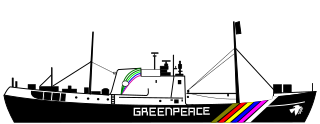
The sinking of Rainbow Warrior, codenamed Opération Satanique, was a state terrorism bombing operation by the "action" branch of the French foreign intelligence agency, the Directorate-General for External Security (DGSE), carried out on 10 July 1985. During the operation, two operatives sank the flagship of the Greenpeace fleet, Rainbow Warrior, at the Port of Auckland on her way to a protest against a planned French nuclear test in Moruroa. Fernando Pereira, a photographer, drowned on the sinking ship.
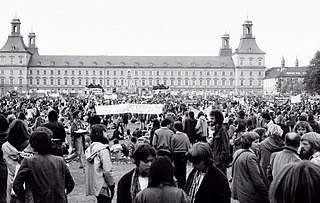
The anti-nuclear movement is a social movement that opposes various nuclear technologies. Some direct action groups, environmental movements, and professional organisations have identified themselves with the movement at the local, national, or international level. Major anti-nuclear groups include Campaign for Nuclear Disarmament, Friends of the Earth, Greenpeace, International Physicians for the Prevention of Nuclear War, Peace Action, Seneca Women's Encampment for a Future of Peace and Justice and the Nuclear Information and Resource Service. The initial objective of the movement was nuclear disarmament, though since the late 1960s opposition has included the use of nuclear power. Many anti-nuclear groups oppose both nuclear power and nuclear weapons. The formation of green parties in the 1970s and 1980s was often a direct result of anti-nuclear politics.

Since the mid 1980s, the largest source of electricity in France has been nuclear power, with a generation of 379.5 TWh in 2019 and a total electricity production of 537.7 TWh. In 2018, the nuclear share was 71.67%, the highest percentage in the world.
Nuclear power in the United Kingdom generated 16.1% of the country's electricity in 2020. As of August 2022, the UK has 9 operational nuclear reactors at five locations, producing 5.9 GWe. It also has nuclear reprocessing plants at Sellafield and the Tails Management Facility (TMF) operated by Urenco in Capenhurst.

EDF Energy is a British integrated energy company, wholly owned by the French state-owned EDF, with operations spanning electricity generation and the sale of natural gas and electricity to homes and businesses throughout the United Kingdom. It employs 11,717 people, and handles 5.22 million business and residential customer accounts.
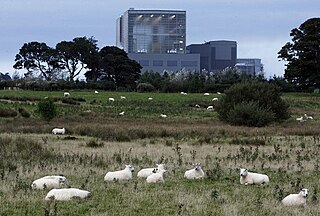
Hunterston B nuclear power station is a shut-down AGR nuclear power station in North Ayrshire, Scotland. Located about 6 miles (9.7 km) south of Largs and about 2.5 miles (4.0 km) northwest of West Kilbride on the Firth of Clyde coast. It is currently operated by EDF Energy, and began producing electricity in 1976.
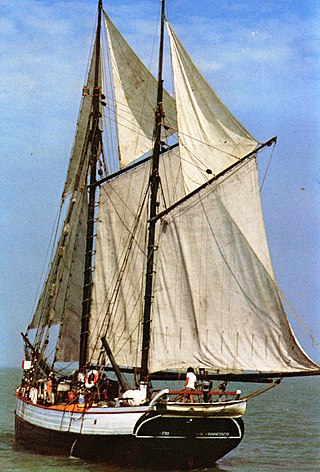
Fri, a New Zealand yacht, led a flotilla of yachts in an international protest against atmospheric nuclear tests at Moruroa in French Polynesia in 1973. Fri was an important part of a series of anti-nuclear protest campaigns out of New Zealand which lasted thirty years, from which New Zealand declared itself a nuclear-free zone which was enshrined in legislation in what became the New Zealand Nuclear Free Zone, Disarmament, and Arms Control Act 1987. In 1974, coordinated by Greenpeace New Zealand, the Fri embarked on a 3-year epic 25,000 mile "Pacific Peace Odyssey" voyage, carrying the peace message to all nuclear states around the world.
In 1984, Prime Minister David Lange banned nuclear-powered or nuclear-armed ships from using New Zealand ports or entering New Zealand waters. Under the New Zealand Nuclear Free Zone, Disarmament, and Arms Control Act 1987, territorial sea, land and airspace of New Zealand became nuclear-free zones. This has since remained a part of New Zealand's foreign policy.
Anti-nuclear organizations may oppose uranium mining, nuclear power, and/or nuclear weapons. Anti-nuclear groups have undertaken public protests and acts of civil disobedience which have included occupations of nuclear plant sites. Some of the most influential groups in the anti-nuclear movement have had members who were elite scientists, including several Nobel Laureates and many nuclear physicists.
Cumbrians Opposed to a Radioactive Environment (CORE) is a non-political, non-profit organisation, located in Barrow-in-Furness, which since 1980 has campaigned against all aspects of the operation of Sellafield, formerly Windscale, and the site of the 1957 reactor fire. Issues of current interest are radioactive air and sea discharges, resultant environmental contamination, and the health detriment to local communities and wildlife. As well as preparing compensation cases for Sellafield workers, CORE has taken part in many direct action campaigns which have resulted in a string of injunctions.

The anti-nuclear movement in the United Kingdom consists of groups who oppose nuclear technologies such as nuclear power and nuclear weapons. Many different groups and individuals have been involved in anti-nuclear demonstrations and protests over the years.
London Greenpeace was an anarchist environmentalist activist collective that existed between 1972 and 2001. They were based in London, and came to international prominence when two of their activists refused to capitulate to McDonald's in the landmark libel case known as "McLibel". It was not affiliated with Greenpeace International nor with Greenpeace UK.
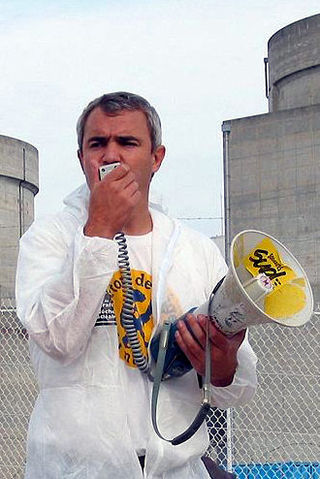
In the 1970s, an anti-nuclear movement in France, consisting of citizens' groups and political action committees, emerged. Between 1975 and 1977, some 175,000 people protested against nuclear power in ten demonstrations.
References
- ↑ Jon Kelly. Nuclear veterans vow to fight on BBC News, 10 January 2008.
- 1 2 "Barrow woman victim of espionage scandal". Evening Mail. 18 November 2011. Archived from the original on 21 April 2013.